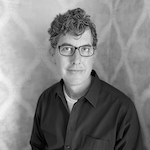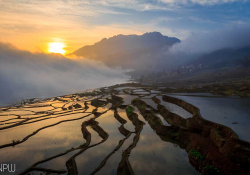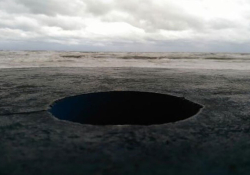Editor’s Choice: Audio Poetry for National Poetry Month
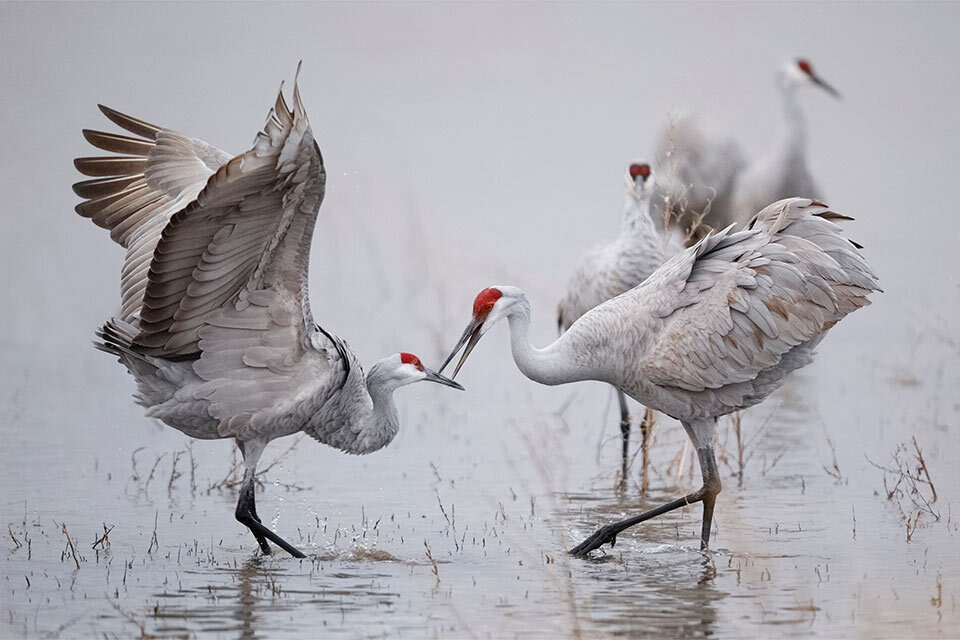
Since 2011, WLT has built up a Soundcloud archive of more than two hundred recordings consisting mostly of audio poetry. The poems are often in bilingual or trilingual versions read by the authors themselves, accompanied by many brilliant English-language renditions by the translators who serve as cultural ferriers between the farther shores of literature. As editor in chief, it’s been my privilege to serve as a metaphorical deckhand, gathering these treasures into the hold (pages) of WLT. In celebration of National Poetry Month 2024, here are five of my favorite audio poems.
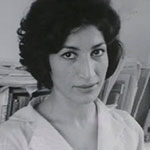 One of the most perennially popular poems on the WLT website is “Reborn,” by Iranian poet and filmmaker Forugh Farrokhzad (1935–1967), translated by Sholeh Wolpé. As I write this reflection on the day after the vernal equinox, I’m reminded of Eliot’s lines about April “breeding / Lilacs out of the dead land, mixing / Memory and desire, stirring / Dull roots with spring rain.” Farrokhzad’s “Reborn” rivals and in many ways surpasses Eliot’s Waste Land by centering female desire in the multiple rebirths represented by the poem: grafting, planting, sprouting, nesting, and more. “Reborn” is frequently full of dark observation and intimations of death, but the speaker keeps returning to metaphors of regeneration, as in this evocative couplet: “in the hollow of my ink-stained palms / swallows will make their nest.” Hearing the Farsi is an auditory delight, yet I can only imagine the rich nuance of the original poem. Thankfully, Wolpé brings much of that richness to her exquisite English translation.
One of the most perennially popular poems on the WLT website is “Reborn,” by Iranian poet and filmmaker Forugh Farrokhzad (1935–1967), translated by Sholeh Wolpé. As I write this reflection on the day after the vernal equinox, I’m reminded of Eliot’s lines about April “breeding / Lilacs out of the dead land, mixing / Memory and desire, stirring / Dull roots with spring rain.” Farrokhzad’s “Reborn” rivals and in many ways surpasses Eliot’s Waste Land by centering female desire in the multiple rebirths represented by the poem: grafting, planting, sprouting, nesting, and more. “Reborn” is frequently full of dark observation and intimations of death, but the speaker keeps returning to metaphors of regeneration, as in this evocative couplet: “in the hollow of my ink-stained palms / swallows will make their nest.” Hearing the Farsi is an auditory delight, yet I can only imagine the rich nuance of the original poem. Thankfully, Wolpé brings much of that richness to her exquisite English translation.
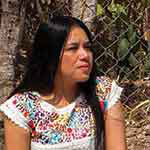 Two poems from Zoque, by Mikeas Sánchez and translated by Wendy Call, appear in the Indigenous Literatures of the Americas issue (September 2023), along with Call’s translator’s note about Sánchez’s poems. “Sánchez was the first woman to ever publish a book of poems in her home language,” Call writes; “her variant of Zoque, Copainalá, has fewer than ten thousand speakers.” The author recorded two of the poems, “[Yesterday]” and “[I want to join the pilgrimage of butterflies],” in both Zoque and Spanish for the digital edition of the issue. Reading along while Sánchez reads the poems aloud, I’m struck by the repetition of the second poem’s incipit in Zoque (“Ne’ sutu’ ‘wyrä’ tanhtanh’jinh”) in the anaphora of lines 3 and 5 of the poem: the “Ne’ sutu’ . . .” of the original seems even more lyrical than the blunt “Quiero . . .” and “I want . . .” of the Spanish and English translations. The poem concludes with the repetition of the question “Where . . .” and a haunting final line, “Where does the soul’s falcon cry alight?”
Two poems from Zoque, by Mikeas Sánchez and translated by Wendy Call, appear in the Indigenous Literatures of the Americas issue (September 2023), along with Call’s translator’s note about Sánchez’s poems. “Sánchez was the first woman to ever publish a book of poems in her home language,” Call writes; “her variant of Zoque, Copainalá, has fewer than ten thousand speakers.” The author recorded two of the poems, “[Yesterday]” and “[I want to join the pilgrimage of butterflies],” in both Zoque and Spanish for the digital edition of the issue. Reading along while Sánchez reads the poems aloud, I’m struck by the repetition of the second poem’s incipit in Zoque (“Ne’ sutu’ ‘wyrä’ tanhtanh’jinh”) in the anaphora of lines 3 and 5 of the poem: the “Ne’ sutu’ . . .” of the original seems even more lyrical than the blunt “Quiero . . .” and “I want . . .” of the Spanish and English translations. The poem concludes with the repetition of the question “Where . . .” and a haunting final line, “Where does the soul’s falcon cry alight?”
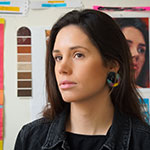 Chelsea T. Hicks’s bilingual Wahzhazhe ie / English poem, rendered as “i want you to help us talk” in English, also appears in the September 2023 issue. Hicks, a Wahzhazhe writer and citizen of the Osage Nation, visited the University of Oklahoma campus in summer 2023 to record the poem. It’s a text that explicitly foregrounds the violence of abuse—on the spoken language, on the body, and on the “annihilated land”: “we will keep our talk,” Hicks writes, “decode these markings” (Ie a^kokipshe na^pe / Waleze ie washka^). Listening to Hicks read the poem in Wahzhazhe ie, I’m mesmerized by the multiple sign systems that circulate between the two versions of the poem and Hicks’s collaborative visual poem project, called Waleze, that accompanies the text. In Hicks’s Waleze sign system, Cody Hammer’s photo depicts Emmrie Mashunkashey along with Hicks’s painted version of Mashunkashey’s Wahzhazhe ie poem in the same frame, which, translated into English, reads: “I love you / I miss you / I want to walk forward / in peace & happiness.” The serenity of the photo and the recording of “ie wa^thakika^ ko^bra / i want you to help us talk” are troubled by the violence that persists just beneath the surface.
Chelsea T. Hicks’s bilingual Wahzhazhe ie / English poem, rendered as “i want you to help us talk” in English, also appears in the September 2023 issue. Hicks, a Wahzhazhe writer and citizen of the Osage Nation, visited the University of Oklahoma campus in summer 2023 to record the poem. It’s a text that explicitly foregrounds the violence of abuse—on the spoken language, on the body, and on the “annihilated land”: “we will keep our talk,” Hicks writes, “decode these markings” (Ie a^kokipshe na^pe / Waleze ie washka^). Listening to Hicks read the poem in Wahzhazhe ie, I’m mesmerized by the multiple sign systems that circulate between the two versions of the poem and Hicks’s collaborative visual poem project, called Waleze, that accompanies the text. In Hicks’s Waleze sign system, Cody Hammer’s photo depicts Emmrie Mashunkashey along with Hicks’s painted version of Mashunkashey’s Wahzhazhe ie poem in the same frame, which, translated into English, reads: “I love you / I miss you / I want to walk forward / in peace & happiness.” The serenity of the photo and the recording of “ie wa^thakika^ ko^bra / i want you to help us talk” are troubled by the violence that persists just beneath the surface.
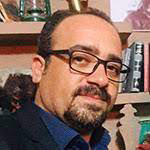 Kurdish poet Kawan Nahaee’s “Homeland” was one of four poems translated by Shook and Jiyar Homer that appeared on the WLT Weekly in 2020. Shook’s translator’s note helpfully sets up the fraught transnational context of Nahaee’s poems, and the poet’s audio recording of “Homeland” lends an aural poignancy to the text’s opening lines: “I have put my homeland in a backpack / and I take it from country to country / I would like for all the world to see it.”
Kurdish poet Kawan Nahaee’s “Homeland” was one of four poems translated by Shook and Jiyar Homer that appeared on the WLT Weekly in 2020. Shook’s translator’s note helpfully sets up the fraught transnational context of Nahaee’s poems, and the poet’s audio recording of “Homeland” lends an aural poignancy to the text’s opening lines: “I have put my homeland in a backpack / and I take it from country to country / I would like for all the world to see it.”
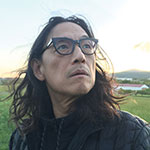 Finally, Li-Young Lee’s “God Is Burning,” like Farrokhzad’s “Reborn,” is a poem ostensibly about springtime. The poem’s first five quatrains alternate between the wound, pain, loneliness, and sigh of God measured against the wound, pain, loneliness, and sigh of the speaker. The speaker’s sigh reminds him that he belongs to the brotherhood of both Cain and Abel; “The sigh I sigh . . . fans every lit cell of me, // breathing, naked, hungry, thirsty, and sore / since birth.” On the page, it’s impossible to tell if the homograph of “tear . . . tear” in the final quatrain should be read as lachrymose or sundering (the answer is both, in turn). Hearing Lee’s stately and cadenced reading of the poem gives us the answer aurally, and listening to the poem is like being present at the ur-spring (or ursprung) of creation in Genesis.
Finally, Li-Young Lee’s “God Is Burning,” like Farrokhzad’s “Reborn,” is a poem ostensibly about springtime. The poem’s first five quatrains alternate between the wound, pain, loneliness, and sigh of God measured against the wound, pain, loneliness, and sigh of the speaker. The speaker’s sigh reminds him that he belongs to the brotherhood of both Cain and Abel; “The sigh I sigh . . . fans every lit cell of me, // breathing, naked, hungry, thirsty, and sore / since birth.” On the page, it’s impossible to tell if the homograph of “tear . . . tear” in the final quatrain should be read as lachrymose or sundering (the answer is both, in turn). Hearing Lee’s stately and cadenced reading of the poem gives us the answer aurally, and listening to the poem is like being present at the ur-spring (or ursprung) of creation in Genesis.
University of Oklahoma
